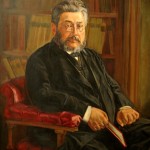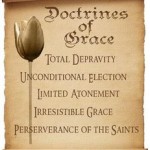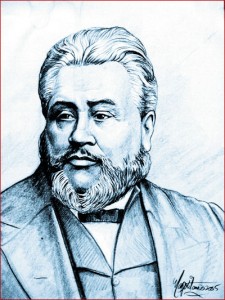 (by Phil Johnson)
(by Phil Johnson)
continued from obviously, was a man who deeply loved Christ. His great compassion and tenderness left an indelible impression on young Charles’s life. Spurgeon’s father, his grandfather, and above all his mother, were therefore strong influences on him spiritually.
On Sunday evenings, Mrs. Spurgeon would gather the children together around the table for Scripture reading and prayer. Spurgeon said she used to pray like this: “Now Lord, if my children go on in their sins, it will not be from ignorance that they perish. My soul must bear swift witness against them at the day of judgment if they lay not hold of Christ.” Spurgeon said the thought of his own mother’s bearing witness against him at the judgment seat of Christ pierced his conscience.
Because of such influences, Charles began to develop a keen sense of his own guilt by the time he was 10 or 11. The thing that burdened him so much was a clear understanding that he was guilty in God’s sight. He didn’t have the limited perspective so many children have—grieving only because they have offended their parents. Spurgeon very seriously seemed to realize, even at a young age, that all his sins were an affront against God Himself.
He also seems not to have suffered from that common human failure most of us have, comparing ourselves with one another and convincing ourselves that we’re all right after all, because we’re so much better than this or that person. Spurgeon knew better than to do that. He wrote this:
I could not believe that it was possible that my sins could be forgiven. I do not know why, but I seemed to be the odd person in the world. When the catalogue was made out, it appeared to me that, for some reason, I must have been left out. If God had saved me, and not the world, I should have wondered indeed; but if He had saved all the world except me, that would have seemed to me to be but right. And now, being saved by grace, I cannot help saying, “I am indeed a brand plucked out of the fire!” [Spurgeon, 103.]
Spurgeon’s unique perspective explains why he regarded himself as one of those “who were kept by God a long time before we found him” [Ibid.]. In his mind, those years of carrying the burden of his sin must have seemed like an eternity. Remember, he was brought up in a pastor’s home in a godly environment from his infancy. He never seems to have succumbed to any sort of vile or gross behavior. He never engaged in any reputation-destroying sins. No scandalous sins appear anywhere in any account of in his life. He was converted at a fairly young age, 16. Yet he kept in his heart until the day he died a very strong sense that he was nothing but a horrible sinner. He never thought of himself as better than anyone. For the rest of his life he retained the fresh memory of that burden of guilt he had carried. And for that reason, he felt a close kinship to people converted to Christ after a long time in the depths of sin.
He wrote,
I love that picture of dear old Christian [in Pilgrim’s Progress]. I know, when I first read The Pilgrim’s Progress, and saw in it the woodcut of Christian carrying the burden on his back, I felt so interested in the poor fellow, that I thought I should jump with joy when, after he had carried his heavy load so long, he at last got rid of it; and that was how I felt when the burden of guilt, which I had borne so long, was for ever rolled away from my shoulders and my heart [Ibid.].
During those years of conviction, Spurgeon was exposed to a lot of preaching about the law and guilt and sin, and all of this only intensified his woes. He records that some of the books that he read during this time included books like, Philip Doddridge’s The Rise and Progress of Religion in the Soul, Richard Baxter’s A Call to the Unconverted, Joseph Alllein’s Alarm to Sinners, and John Angel James’ book called The Anxious Inquirer. All of those books are written to convict over-confident people. Spurgeon said it was like sitting at the foot of Sinai. Fullerton adds this: “He read the Bible through, but found that its threatenings seemed to be printed in capitals and its promises in small type. With perverse ingenuity . . . he twisted everything to his own hurt, applying the cheering words to others and the woeful words to himself” [Fullerton, 27].
Spurgeon later wrote this about the turmoil that he experienced:
Day and night God’s hand was heavy on me. If I slept a night I dreamed of the bottomless pit, and when I awoke I seemed to feel the misery I had dreamed. Up to God’s house I went; my song was but a sigh. To my chamber I retired, and there, with tears and groans, I offered up my prayer without a hope and without a refuge, for God’s law was flogging me with its ten-thonged whip and then rubbing me with brine afterwards, so that I did shake and quiver with pain and anguish [Ibid., 27].
In another place, Spurgeon likened all this preaching of the law to someone who was actually plowing the same ground over and over again, “with a team of ten black horses”—the Ten Commandments.
During those years of conviction no one who knew Spurgeon seemed aware of his inner turmoil. He turned it all inward. Fullerton wrote,
It must not be supposed that the lad became morbid during those years. He lived two lives, one keen, natural, bookish, observant; the other absorbed, fearful, doubting, insurgent. If he had spoken of his trouble, there were those round him who could, perhaps, have helped him out of it; but he battled alone, hiding his thoughts from them all, save once when he spoke to his grandfather of his fear of being a lost soul, and was somewhat comforted for a while. He would not believe because others believed; he must have an assurance of his own; he would not rest until he knew [Ibid., 26.].
Normally, people struggling with this sort of burden will talk to others and desperately reach out for comfort and assurance, and they want to feed off the verbal reassurances people invariably offer. The counselor’s encouragement and comfort may last for a while, but because the issue isn’t really settled in the sinner’s own heart, he or she will go back to doubting. It can be very frustrating to counsel people with that perspective on their own sins.
But Spurgeon knew better. He didn’t feed off the assurance and encouragement that others could give him. He realized his business was with God, and he kept it between him and God. There’s no doubt that it would have been good for Spurgeon to seek counsel from his grandparents, from his parents, or from other mature believers around him. They might have at least helped him bear the burden and certainly would have prayed diligently for him. But he didn’t seek that kind of help.
He describes what happened in those dark days of conviction:
While under concern of soul, I resolved that I would attend all the places of worship in the town where I lived, in order that I might find out the way of salvation. I was willing to do anything, and be anything, if God would only forgive my sin. I set off, determined to go round to all the chapels, and I did go to every place of worship; but for a long time I went in vain. I do not, however, blame the ministers. One man preached Divine Sovereignty; I could hear him with pleasure, but what was that sublime truth to a poor sinner who wished to know what he must do to be saved? There was another admirable man who always preached about the law; but what was the use of ploughing up ground that needed to be sown? Another was a practical preacher. I heard him, but it was very much like a commanding officer teaching the manoeuvres of war to a set of men without feet. What could I do? All his exhortations were lost on me. I knew it, was said, “Believe on the Lord Jesus Christ, and thou shalt be saved;” but I did not know what it was to believe on Christ. These good men all preached truths suited to many in their congregations who were spiritually-minded people; but what I wanted to know was,—”How can I get my sins forgiven?”—and they never told me that. I desired to hear how a poor sinner, under a sense of sin, might find peace with God; and when I went, I heard a sermon on “Be not deceived, God is not mocked,” which cut me up still worse; but did not bring me into rest. I went again, another day, and the text was something about the glories of the righteous; nothing for poor me! I was like a dog under the table, not allowed to eat of the children’s food. I went time after time, and I can honestly say that I do not know that I ever went without prayer to God, and I am sure there was not a more attentive hearer than myself in all the place, for I panted and longed to understand how I might be saved [Spurgeon, 104-105].
Spurgeon’s experience later helped shape his ministry. He remembered his frustration in wanting to hear the gospel but never hearing anything but law preached. That is why there is such a strong evangelistic thrust in almost every sermon Spurgeon ever preached. He almost never stood up in the pulpit without clearly giving the way of salvation and calling sinners to Christ.
Ultimately, Spurgeon’s conversion came through the most unlikely circumstances. One Sunday morning, while Spurgeon was in this phase of sampling various churches, a terrible snowstorm virtually shut down the little town of Colchester. Spurgeon was home from his boarding school for Christmas holidays. The date can be determined with absolute precision. It was Sunday, January 6, 1850. The snowstorm started early in the morning. Spurgeon had gotten up early in the morning because he had plans to go to a particular chapel on the other side of town. But just as Spurgeon began to make his way to church, the snowstorm grew worse.
Spurgeon himself recounted what happened:
I sometimes think I might have been in darkness and despair until now had it not been for the goodness of God in sending a snowstorm, one Sunday morning, while I was going to a certain place of worship. When I could go no further, I turned down a side street, and came to a little Primitive Methodist Chapel. In that chapel there may have been a dozen or fifteen people. I had heard of the Primitive Methodists, how they sang so loudly that they made people’s heads ache; but that did not matter to me. I wanted to know how I might be saved, and if they could tell me that, I did not care how much they made my head ache. The minister did not come that morning; he was snowed up, I suppose. At last, a very thin-looking man,* a shoemaker, or tailor, or something of that sort, went up into the pulpit to preach. Now, it is well that preachers should be instructed; but this man was really stupid. He was obliged to stick to his text, for the simple reason that he had little else to say. The text was,—
“LOOK UNTO ME, AND BE YE SAVED, ALL THE ENDS OF THE EARTH.”
He did not even pronounce the words rightly, but that did not matter. There was, I thought, a glimpse of hope for me in that text. The preacher began thus—”My dear friends, this is a very simple text indeed. It says, ‘Look.’ Now lookin’ don’t take a deal of pains. It ain’t liftin’ your foot or your finger; it is just, ‘Look.’ Well, a man needn’t go to College to learn to look. You may be the biggest fool, and yet you can look. A man needn’t be worth a thousand a year to be able to look. Anyone can look; even a child can look. But then the text says, ‘Look unto Me.’ Ay!” said he, in broad Essex, “many on ye are lookin’ to yourselves, but it’s no use lookin’ there. You’ll never find any comfort in yourselves. Some look to God the Father. No, look to Him by-and-by. Jesus Christ says, ‘Look unto Me.’ Some on ye say, ‘We must wait for the Spirit’s workin’.’ You have no business with that just now. Look to Christ. The text says, ‘Look unto Me.'” Then the good man followed up his text in this way:—”Look unto Me; I am sweatin’ great drops of blood. Look unto Me; I am hangin’ on the cross. Look unto Me; I am dead and buried. Look unto Me; I rise again. Look unto Me; I ascend to Heaven. Look unto Me; I am sittin’ at the Father’s right hand. O poor sinner, look unto Me! look unto Me! When he had gone to about that length, and managed to spin out ten minutes or so, he was at the end of his tether. Then he looked at me under the gallery, and I daresay, with so few present, he knew me to be a stranger. Just fixing his eyes on me, as if he knew all my heart, he said, “Young man, you look very miserable.” Well, I did; but I had not been accustomed to have remarks made from the pulpit on my personal appearance before. However, it was a good blow, struck right home. He continued, “and you always will be miserable—miserable in life, and miserable in death,—if you don’t obey my text; but if you obey now, this moment, you will be saved.” Then, lifting up his hands, he shouted, as only a Primitive Methodist could do, “Young man, look to Jesus Christ. Look! Look! Look! You have nothin’ to do but to look and live.” I saw at once the way of salvation. I know not what else he said,—I did not take much notice of it,—I was so possessed with that one thought. Like as when the brazen serpent was lifted up, the people only looked and were healed, so it was with me. I had been waiting to do fifty things, but when I heard that word, “Look!” what a charming word it seemed to me! Oh! I looked until I could almost have looked my eyes away. There and then the cloud was gone, the darkness had rolled away, and that moment I saw the sun; and I could have risen that instant, and sung with the most enthusiastic of them, of the precious blood of Christ, and the simple faith which looks alone to Him. Oh, that somebody had told me this before, “Trust Christ, and you shall be saved” [Spurgeon, 105-108.].
Spurgeon began preaching right after his conversion. He was converted in January, 1850. Amazingly, less than five years later he was called to be the pastor of the largest Baptist church in London. So within four years after his conversion, he preached his first sermon as the pastor in the pulpit of the congregation he would shepherd until the day he died. He never attended university or seminary. He seems to have sprung full grown into maturity as a pastor, preacher and a theologian.
But the truth behind Spurgeon’s remarkable ministry is that many of the influences that made him what he was were related to his earliest upbringing. They were the influences he gained from a godly home life, under the oversight of godly parents and grandparents.
 A. Scriptures about God’s effecting conception:
A. Scriptures about God’s effecting conception:
 (1) If you are not adverse to extreme satire, you might enjoy this
(1) If you are not adverse to extreme satire, you might enjoy this  Richard Lucas is a Resident with The NETS Institute for Church Planting and a Ph.D. candidate in New Testament at The Southern Baptist Theological Seminary. He has writen two excellent articles describing the theological map of Reformed thought:
Richard Lucas is a Resident with The NETS Institute for Church Planting and a Ph.D. candidate in New Testament at The Southern Baptist Theological Seminary. He has writen two excellent articles describing the theological map of Reformed thought: Texts lifted out of their setting can be made to support many erroneous views and heresies. Surely, a text out of context is a pretext for all false doctrine. However, error is exposed when individual texts are subjected to analysis such as identifying the background, use of words, context, syntax, etc.
Texts lifted out of their setting can be made to support many erroneous views and heresies. Surely, a text out of context is a pretext for all false doctrine. However, error is exposed when individual texts are subjected to analysis such as identifying the background, use of words, context, syntax, etc. John chapter ten is one of the most beautiful in all of Scripture, for it speaks of the Lord Jesus’ relationship to His people in the terms of the Shepherd and His sheep. In the midst of talking about the glorious salvation that belongs to those who know and trust Christ, Jesus asserts that He and the Father are one in their bringing about the final and full salvation of all those who are given by the Father to the Son (vv. 28-30). When the Lord says, “I and the Father are one,”[1] He offends the Jews, who realize that such a claim implies deity. No mere creature can be fully one with the Father in bringing about redemption itself! This prompts the dialogue that concerns us here:
John chapter ten is one of the most beautiful in all of Scripture, for it speaks of the Lord Jesus’ relationship to His people in the terms of the Shepherd and His sheep. In the midst of talking about the glorious salvation that belongs to those who know and trust Christ, Jesus asserts that He and the Father are one in their bringing about the final and full salvation of all those who are given by the Father to the Son (vv. 28-30). When the Lord says, “I and the Father are one,”[1] He offends the Jews, who realize that such a claim implies deity. No mere creature can be fully one with the Father in bringing about redemption itself! This prompts the dialogue that concerns us here: (by Phil Johnson)
(by Phil Johnson) “Jesus was not revolutionary because he said we should love God and each other. Moses said that first. So did Buddha, Confucius, and countless other religious leaders we’ve never heard of. Madonna, Oprah, Dr. Phil, the Dali Lama, and probably a lot of Christian leaders will tell us that the point of religion is to get us to love each other. “God loves you” doesn’t stir the world’s opposition. However, start talking about God’s absolute authority, holiness, Christ’s substitutionary atonement, justification by faith apart from works, the necessity of new birth, repentance, baptism, Communion, and the future judgment, and the mood in the room changes considerably.”
“Jesus was not revolutionary because he said we should love God and each other. Moses said that first. So did Buddha, Confucius, and countless other religious leaders we’ve never heard of. Madonna, Oprah, Dr. Phil, the Dali Lama, and probably a lot of Christian leaders will tell us that the point of religion is to get us to love each other. “God loves you” doesn’t stir the world’s opposition. However, start talking about God’s absolute authority, holiness, Christ’s substitutionary atonement, justification by faith apart from works, the necessity of new birth, repentance, baptism, Communion, and the future judgment, and the mood in the room changes considerably.” Phil Johnson of spurgeon.org writes:
Phil Johnson of spurgeon.org writes: